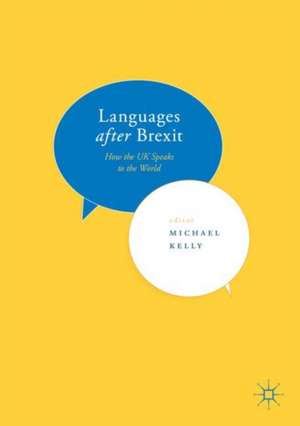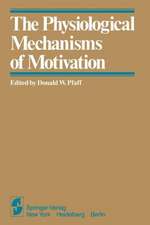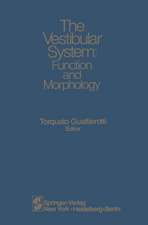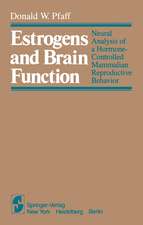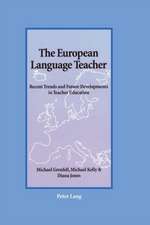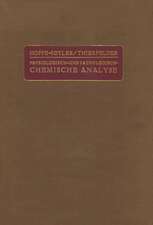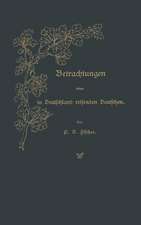Languages after Brexit: How the UK Speaks to the World
Editat de Michael Kellyen Limba Engleză Paperback – 26 oct 2017
Preț: 277.11 lei
Nou
Puncte Express: 416
Preț estimativ în valută:
53.03€ • 55.22$ • 44.82£
53.03€ • 55.22$ • 44.82£
Carte disponibilă
Livrare economică 14-28 februarie
Preluare comenzi: 021 569.72.76
Specificații
ISBN-13: 9783319651682
ISBN-10: 3319651684
Pagini: 271
Ilustrații: XXIII, 271 p. 5 illus., 3 illus. in color.
Dimensiuni: 148 x 210 x 20 mm
Greutate: 0.39 kg
Ediția:1st ed. 2018
Editura: Springer International Publishing
Colecția Palgrave Macmillan
Locul publicării:Cham, Switzerland
ISBN-10: 3319651684
Pagini: 271
Ilustrații: XXIII, 271 p. 5 illus., 3 illus. in color.
Dimensiuni: 148 x 210 x 20 mm
Greutate: 0.39 kg
Ediția:1st ed. 2018
Editura: Springer International Publishing
Colecția Palgrave Macmillan
Locul publicării:Cham, Switzerland
Cuprins
Chapter 1. Introduction; Jean Coussins and Philip Harding-Esch.- Part I. Living in a world of languages.- Chapter 2.Why are so many people resistant to other languages?; Michael Kelly.- Chapter 3. Trouble with English?; Jennifer Jenkins.- Chapter 4. A language-rich future for the UK; Maria K Norton.- Part II. What the UK needs in languages.- Chapter 5. This post-Brexit Linguanomics; Gabrielle Hogan-Brun.- Chapter 6. Speaking to a global future – the increasing value of language and culture to British business post-Brexit; Bernardette Holmes.- Chapter 7. Science and languages; Charles Forsdick.- Chapter 8. Languages in the Eye of the Law; Ann Carlisle.- Chapter 9. Language Plenty, Refugees and the post-Brexit world. New Practices from Scotland; Alison Phipps.- Chapter 10. What every policy maker needs to know about cognitive benefits of bilingualism; Dina Mehmedbegovic.- PartIII. Where the UK stands in language capacity.- Chapter 11. Languages in English secondary schools post-Brexit; Teresa Tinsley.- Chapter 12. Modern Languages in Scotland in the context of Brexit; Hannah Doughty and Marion Spöring.- Chapter 13. Speaking from Wales: Building a Modern Languages Community in the Era of Brexit; Claire Gorrara.- Chapter 14. Languages in Northern Ireland: policy and practice; Janice Carruthers and Mícheál Ó Mainnín.- Chapter 15. Building capacity in UK Higher Education; Jocelyn Wyburd.- Chapter 16. Support unsung heroes: community-based language learning and teaching; Kate Borthwick.- Chapter 17. Language learning by different means: formal and informal developments; Tim Connell.- Chapter 18. Translation and Interpreting in a post-Brexit Britain; Myriam Salama-Carr, Svetlana Carsten, Helen Campbell.- Chapter 19. Language Teacher Supply: the vicious cycle, the effects of theEU referendum and attempts to solve supply shortage; René Koglbauer.- Part IV. What can be done to make the UK language-ready?.- Chapter 20. Collaboration, connectedness, champions: approaches within government; Wendy Ayres-Bennett.- Chapter 21. Speaking to the world about speaking to the world; David Crystal.- Chapter 22. Conclusion: Steps towards a strategy for the UK; Michael Kelly
Recenzii
“Languages after Brexit: How the UK Speaks to the World is a timely and thought-provoking study. … the first book-length research of the linguistic issues pertaining to Brexit and should be of interest to all who are involved in the academic study of the interplay between languages and politics. … It is believed that more research output in this respect will be yielded.” (Hong Diao, Journal of Language and Politics, Vol. 19 (1), 2018)
Notă biografică
Michael Kelly is Emeritus Professor of French at the University of Southampton, UK. A specialist in modern French culture and society, he is active in developing public policy relating to languages and cultural diversity. He edits the European Journal of Language Policy, while his most recent books focus on languages in the context of war and conflict.
Textul de pe ultima copertă
This book represents a significant intervention into the debates surrounding Brexit and language policy. It analyses the language capabilities and resources of the United Kingdom in a new, post-referendum climate, in which public hostility towards foreign languages is matched by the necessity of renegotiating and building relationships with the rest of Europe and beyond. The authors scrutinize the availability of key resources in diverse sectors of society including politics, economics, business, science and education, while simultaneously offering practical advice and guidance on how to thrive in the new international environment. This extremely timely edited collection brings together leading researchers from across the field of language policy, and is sure to appeal not only to students and scholars of this subject, but also to practitioners, policy makers and educators.
Michael Kelly is Emeritus Professor of French at the University ofSouthampton, UK. A specialist in modern French culture and society, he is active in developing public policy relating to languages and cultural diversity. He edits the European Journal of Language Policy, while his most recent books focus on languages amidst war and conflict.
Caracteristici
Represents the definitive assessment of the UK’s language needs and capabilities as the country faces up to Brexit Brings together leading experts in language policy from across politics, economics, business, science and education Provides accessible, informed interventions on the key challenges and opportunities facing languages in the UK
